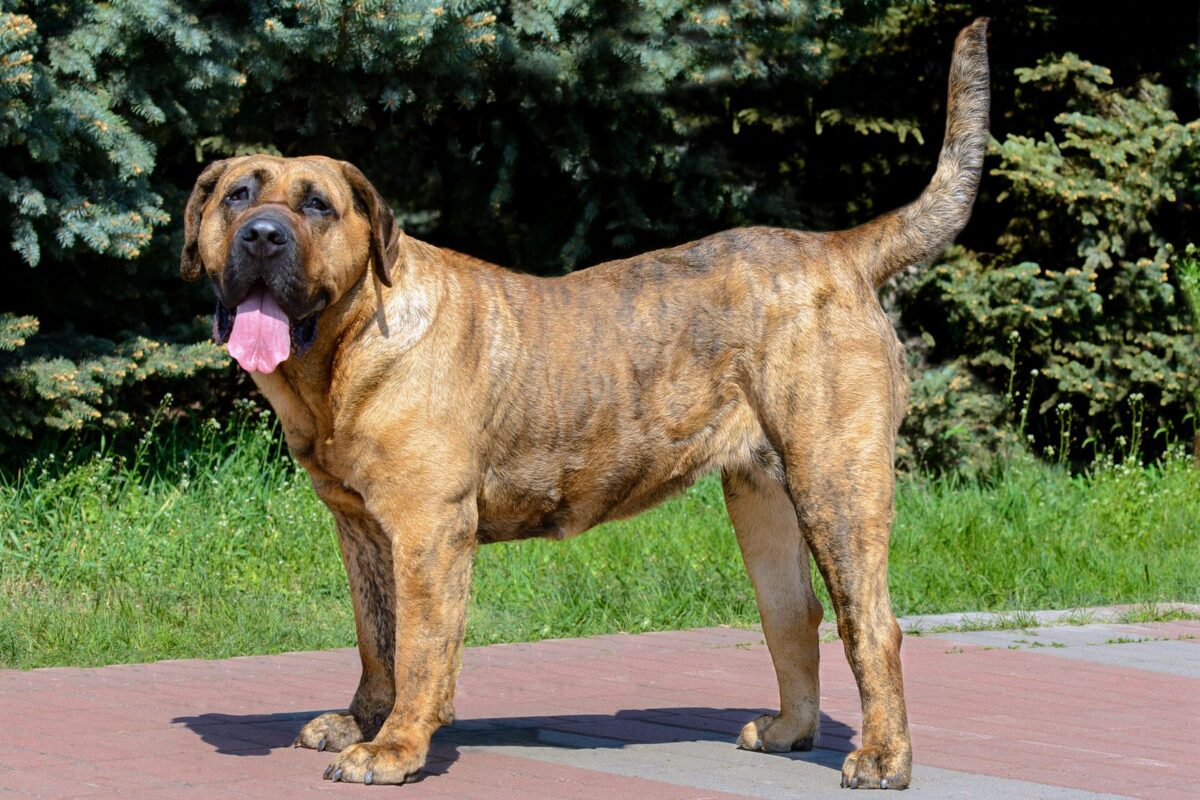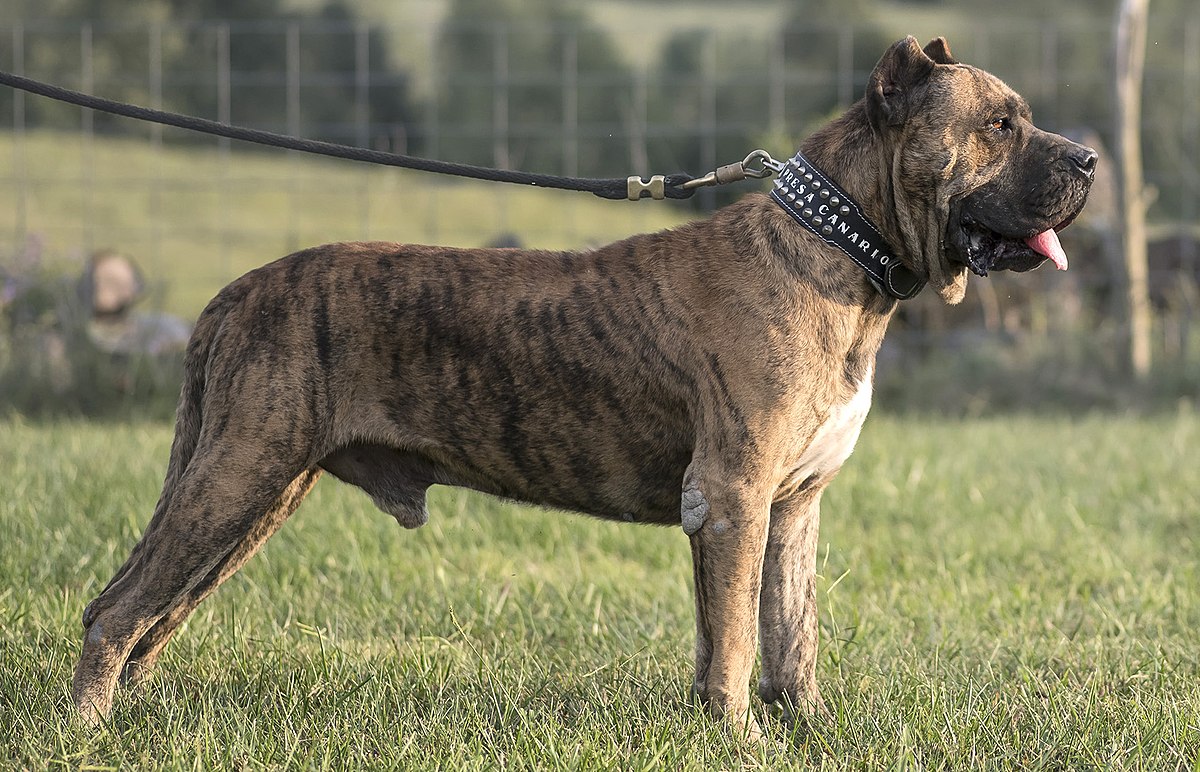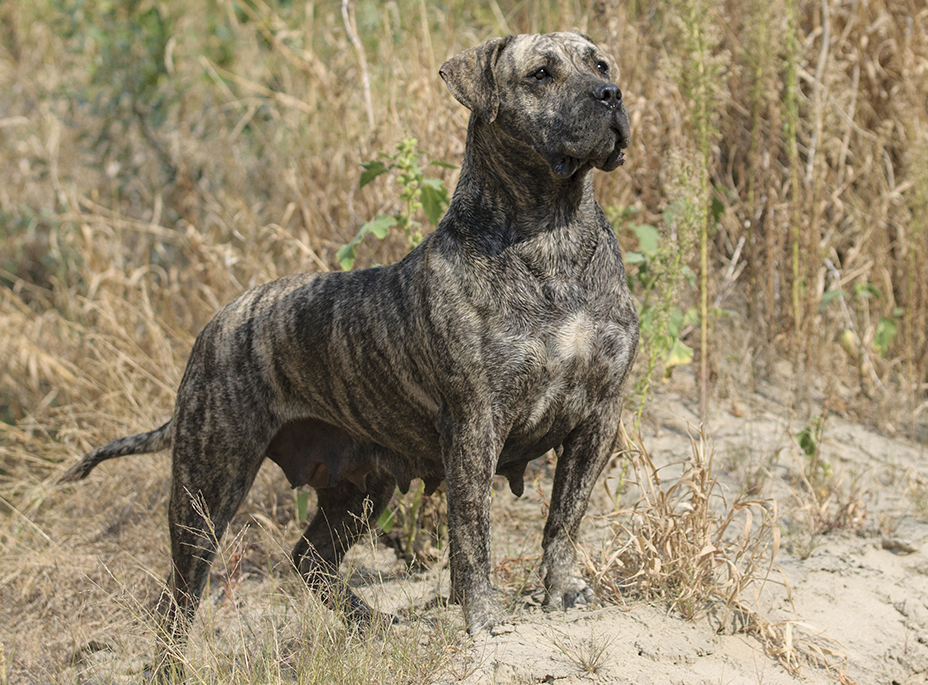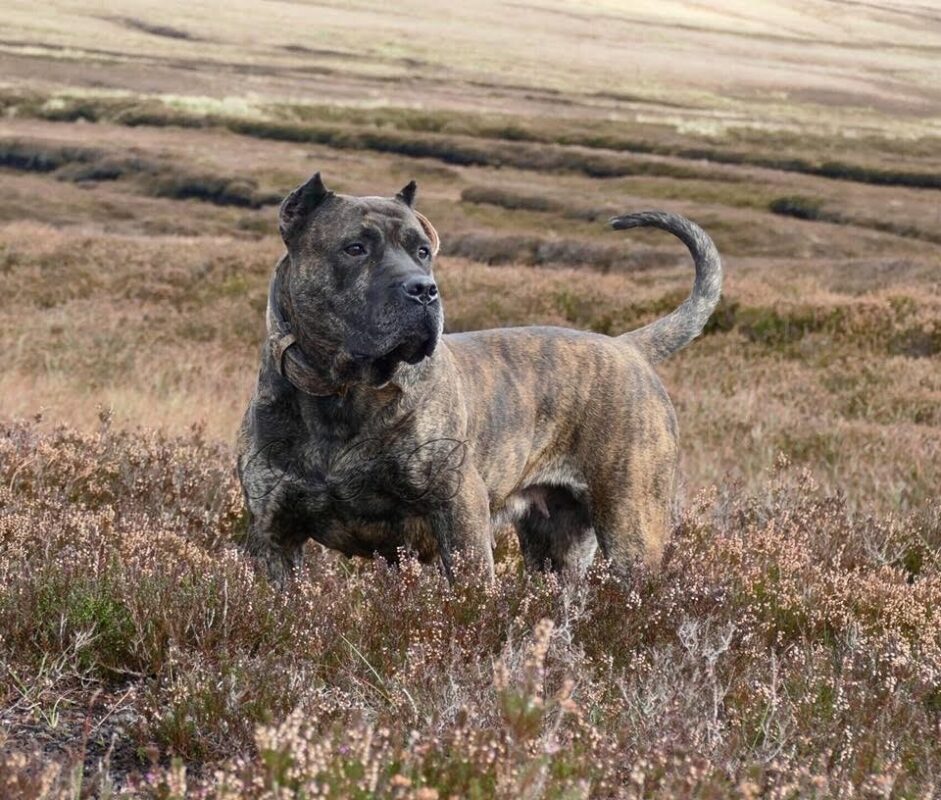Presa Canario: Powerful Guardian and Gentle Giant | Breed Guide 2025
Discover the loyal Presa Canario, a muscular Spanish breed perfect as a family guardian. Learn about its history, traits, and training tips for a devoted companion.
Have you ever heard of a dog breed that’s both a loyal guardian and a gentle giant? Meet the Presa Canario, a Spanish mastiff-type breed that’s capturing the hearts of dog enthusiasts across the U.S.
Originating from the Canary Islands, the Presa Canario has a rich history as a working dog. Known for their impressive strength and protective nature, these dogs were traditionally used for guarding, herding, and even dog fighting before it was outlawed. Today, they’re valued as devoted family companions and excellent guard dogs. We’ll explore the unique characteristics of this breed, from their muscular build to their affectionate personality, and discuss why proper training and socialization are crucial for these powerful pups.
The Presa Canario: An Overview of the Canary Mastiff
The Presa Canario, also known as the Canary Mastiff or Dogo Canario, is a powerful and imposing breed that hails from the Canary Islands. This large, muscular dog has a rich history as a working breed, originally used for guarding, herding, and unfortunately, dog fighting. Today, the Presa Canario has found its place as a loyal companion and formidable guardian.
Origin and History
The Presa Canario’s roots trace back to the Canary Islands, particularly Gran Canaria and Tenerife. The breed evolved from a mix of native dogs and molossoid-type breeds introduced during the colonial period. British dogs brought to the islands in the late 19th century also influenced the breed’s development.
Initially, Presa Canarios served multiple purposes:
- Guarding livestock and property
- Herding sheep and cattle
- Participating in dog fights (until banned in 1936)
The breed faced near-extinction in the 1960s due to factors like:
- Prohibition of dog fighting
- Introduction of other guard dog breeds
- Changing agricultural practices
Thanks to the efforts of the Club Español del Presa Canario, established in 1982, the breed was revived. The Presa Canario gained official recognition from:
- Spanish national government (2001)
- Fédération Cynologique Internationale (2011)
Physical Characteristics
The Presa Canario is a large, muscular dog with a distinctive appearance:
| Feature | Description |
|---|---|
| Height | Males: 60-66 cm (24-26 in) Females: 56-62 cm (22-24 in) |
| Weight | Males: 50-65 kg (110-145 lb) Females: 40-55 kg (90-120 lb) |
| Coat | Short, dense, and typically brindle or fawn |
| Head | Large, broad, and cube-shaped |
| Ears | Medium-sized, hanging close to the head |
| Eyes | Medium-sized, almond-shaped, ranging from medium to dark brown |
| Tail | Thick, tapering to a point, reaching the hock |
The breed’s imposing stature and muscular build contribute to its effectiveness as a guard dog. Their deep bark and alert demeanor serve as natural deterrents to potential intruders.
Temperament and Personality
Presa Canarios are known for their:
- Loyalty to family
- Protective nature
- Intelligence
- Calm demeanor (when properly trained and socialized)
While affectionate with their families, Presa Canarios can be wary of strangers. Early socialization and consistent training are crucial to ensure they develop into well-balanced adults. Their strong guarding instincts make them excellent protectors, but also require responsible ownership to manage their territorial tendencies.
Exercise and Training Needs
Presa Canarios require:
- Regular exercise (daily walks, playtime)
- Mental stimulation (training sessions, puzzle toys)
- Consistent, firm training from an experienced owner
Even though their size, Presa Canarios adapt well to various living situations, provided they receive adequate exercise and attention. Their intelligence makes them responsive to training, but their strong-willed nature necessitates a confident, experienced handler.
Health Considerations
Like many large breeds, Presa Canarios are prone to certain health issues:
- Hip dysplasia
- Elbow dysplasia
- Patellar luxation
- Bloat (gastric dilatation-volvulus)
Regular veterinary check-ups, a balanced diet, and appropriate exercise can help mitigate these risks. The breed’s average lifespan is typically 9-11 years.
Is the Presa Canario Right for You?
Owning a Presa Canario requires careful consideration:
Pros:
- Excellent guard dog
- Loyal and affectionate with family
- Impressive appearance
- Adaptable to various living situations (with proper exercise)
Cons:
- Requires experienced handling
- Strong guarding instincts need management
- Potential for aggression if not properly socialized
- High exercise and mental stimulation needs
The Presa Canario isn’t suitable for every household. Prospective owners should honestly assess their ability to provide the necessary training, socialization, and exercise this powerful breed requires. For those who can meet these needs, the Presa Canario can be a loyal, protective, and impressive companion.
Origin and History
The Presa Canario, a powerful mastiff-type breed, originated in the Canary Islands of Spain. Its history dates back to the 15th and 16th centuries, following the Castilian conquest of the archipelago.
Development in the Canary Islands
The Presa Canario evolved from a mix of native island dogs and imported breeds. Its primary ancestors include the Iberian Presa (Perro de Ganado Majorero) and the Bardino Majorero, a pre-Hispanic sheepdog from Fuerteventura. English colonists later introduced Bandogges, Tiedogs, Bull/Terriers, Bulldogs, and Mastiffs, further shaping the breed’s development.

The unique environment and needs of the Canary Islands significantly influenced the Presa Canario’s characteristics. Breeders focused on developing a strong, agile dog capable of working in the islands’ rugged terrain. This selective breeding resulted in a versatile canine with exceptional guarding instincts and the ability to adapt to various tasks.
Historical Roles and Functions
The Presa Canario served multiple roles throughout its history, adapting to the changing needs of the islanders. These dogs were primarily used for:
- Livestock guarding: Protecting cattle and other farm animals from predators and thieves
- Property protection: Serving as formidable guardians for homes and businesses
- Herding: Assisting in managing and moving livestock
- Dog fighting: Unfortunately, they were also bred for this purpose until it was outlawed
The breed’s strength, intelligence, and loyalty made it an invaluable asset to the Canary Islands’ inhabitants. Presa Canarios excelled in their working roles, demonstrating remarkable versatility and adaptability. Their protective nature and imposing presence deterred intruders, while their herding abilities helped manage livestock efficiently.
As the islands’ economy evolved, so did the Presa Canario’s functions. They transitioned from primarily working dogs to becoming prized companions and guardians for families. This shift in roles contributed to the breed’s near-extinction in the 1960s, as the demand for traditional working dogs decreased.
Physical Characteristics
The Presa Canario boasts a striking physical presence that commands attention. This breed’s impressive stature and muscular build are complemented by a range of distinctive features that set it apart from other large dog breeds.
Size and Appearance
The Presa Canario is a large to medium-sized dog with a powerful, muscular build. Males typically stand 22-27 inches (55-68 cm) at the withers and weigh 80-130 pounds (36-59 kg). Females are slightly smaller, measuring 20-25 inches (50-63 cm) and weighing 60-100 pounds (27-45 kg). Their body structure is mesomorphic, slightly longer than tall, contributing to a feline-like movement. The breed’s head is broad, massive, and square with a brachycephalic shape. A broad muzzle and pendulous upper lip form an inverted V shape when viewed from the front. The chest is deep and broad, with a slightly raised rump completing their imposing silhouette.
Coat Colors and Markings
The Presa Canario’s coat comes in a variety of colors, adding to the breed’s visual appeal. Common coat colors include fawn, brindle, and black, with fawn and brindle being the most prevalent. Fawn coats range from light to dark shades, while brindle patterns feature dark stripes on a lighter background. Black coats, though rare, occur in some lines. White markings may appear on the chest, paws, and muzzle, but excessive white is considered a fault in breed standards. The coat is short and dense, lying flat against the body. This sleek coat not only enhances the dog’s muscular appearance but also requires minimal grooming, making the Presa Canario a relatively low-maintenance breed in terms of coat care.
Temperament and Personality
The Presa Canario’s temperament and personality are as distinctive as its physical appearance. These dogs possess a unique combination of traits that make them both formidable guardians and affectionate companions.
Protective Instincts
Presa Canarios are renowned for their strong protective instincts. Their loyalty to family members is unwavering, and they’re naturally inclined to guard their home and loved ones. This breed’s confidence and bravery make them excellent watchdogs, always alert and ready to defend against perceived threats. But, their strong-willed nature requires experienced handling and consistent training to ensure these protective instincts are properly channeled. Early socialization is crucial to prevent overly aggressive behavior towards strangers. Presa Canarios thrive on mental stimulation, excelling in tasks that challenge their problem-solving abilities. Their intelligence allows them to quickly learn commands and adapt to various situations, making them versatile working dogs and family protectors.
Interactions with Family and Other Pets
Within their family circle, Presa Canarios display a softer side. They’re affectionate and gentle with their loved ones, often forming strong bonds with children. But, due to their size and strength, supervision is essential during interactions with young kids. These dogs are typically reserved around strangers, maintaining a cautious demeanor until they determine there’s no threat. When it comes to other pets, Presa Canarios can be territorial and may show aggression towards unfamiliar dogs, especially those of the same sex.
Early socialization and proper introductions are key to fostering positive relationships with other animals in the household. Their high energy levels require regular exercise and mental stimulation to prevent boredom-induced destructive behaviors. With proper training and socialization, Presa Canarios can be well-balanced family companions, showcasing their loyalty and affection while maintaining their natural protective instincts.
Care and Maintenance
Proper care and maintenance are crucial for the health and well-being of Presa Canarios. These powerful dogs require dedicated attention to their exercise, grooming, and nutritional needs to thrive as family companions.
Exercise Requirements
Presa Canarios are high-energy dogs that need substantial physical and mental stimulation. Daily exercise is essential for their overall health and behavior management:
- Two 30-minute walks per day, minimum
- Additional activities like tug-of-war, fetch, or hiking
- Mental stimulation through puzzle toys and obedience training
- Engagement in working dog activities or competitions
As working dogs, Presa Canarios benefit from having a job to do. Competition training in conformation or obedience trials can provide both physical and mental challenges. Their Mediterranean origins make them more tolerant of warm weather, but caution is necessary in extreme heat or cold.
Grooming Needs
Presa Canarios have relatively low-maintenance grooming requirements due to their short coat:
- Weekly brushing to remove loose hair and distribute skin oils
- Occasional baths, typically every 6-8 weeks or as needed
- Regular nail trimming, usually every 2-3 weeks
- Dental care, including brushing teeth 2-3 times per week
- Ear cleaning to prevent infections, especially after swimming or bathing
While professional grooming isn’t typically necessary, regular at-home care helps maintain their coat’s health and appearance. Pay attention to any skin folds, particularly around the face, to prevent irritation or infection.
Nutrition and Feeding Guidelines
Proper nutrition is vital for maintaining the Presa Canario’s muscular build and overall health:
- High-quality, protein-rich diet formulated for large, active breeds
- Balanced meals with appropriate ratios of protein, fats, and carbohydrates
- Portion control to prevent obesity, which can strain joints
- Feeding schedule of 2-3 meals per day, rather than free-feeding
- Fresh water available at all times
Consider consulting with a veterinarian to determine the best diet plan based on your Presa Canario’s age, weight, and activity level. Some owners opt for raw or home-cooked diets, but these should be carefully balanced to meet nutritional requirements. Avoid overfeeding, as Presa Canarios can be prone to weight gain, which can lead to health issues.
Training and Socialization
Proper training and socialization are essential for Presa Canarios to become well-adjusted companions. These powerful dogs require consistent guidance and early exposure to various stimuli to develop into balanced adults.
Importance of Early Training
Early training is crucial for Presa Canarios, beginning as soon as they join the family. The critical socialization period occurs between 3 to 14 weeks of age, during which puppies should be exposed to diverse people, animals, environments, and experiences. This early exposure helps mitigate natural wariness and ensures they’re comfortable in various situations.
Positive reinforcement techniques are highly effective for training Presa Canarios. We use treats, praise, and affection to create positive associations with new experiences and desired behaviors. Consistency in commands and routines helps reinforce training, establishing clear expectations for the dog.
Basic obedience training, including commands like sit, stay, and come, should be prioritized. These foundational skills provide structure and help manage the Presa Canario’s strong-willed nature. Regular training sessions, kept short and captivating, maintain the dog’s interest and reinforce learned behaviors.
Managing Prey Drive
Presa Canarios possess a strong prey drive due to their working dog heritage. Managing this instinct is essential for their safety and the well-being of other animals. We carry out several strategies to address and channel this natural drive:
- Early socialization: Expose Presa Canarios to various animals from a young age, teaching appropriate interactions.
- Consistent training: Use positive reinforcement to reward calm behavior around potential prey animals.
- Leash control: Keep Presa Canarios on a leash during walks to prevent chasing instincts from taking over.
- Secure environment: Ensure a high, secure fence in the yard to prevent escape when outdoors.
- Mental stimulation: Provide puzzle toys and interactive games to channel energy positively.
- Structured playtime: Engage in activities that satisfy the prey drive, such as tug-of-war or fetch, under controlled conditions.
- Avoid triggers: Identify and manage exposure to stimuli that increase prey drive, like high-pitched noises or fast movements.
- Professional assistance: Consult an experienced dog trainer, especially one familiar with large breeds like the Presa Canario, for personalized guidance.
By implementing these strategies consistently, we can effectively manage the Presa Canario’s prey drive while nurturing their positive qualities as loyal and protective companions.
Health Considerations
Presa Canarios are generally healthy dogs, but like all breeds, they’re prone to certain health issues. Understanding these potential problems helps owners provide the best care for their pets.
Common Health Issues
Presa Canarios face several breed-exact health challenges:
- Hip Dysplasia: This genetic condition affects the hip joint, causing pain and arthritis. Regular exercise and maintaining a healthy weight help manage this issue.
- Elbow Dysplasia: Similar to hip dysplasia, this developmental disorder affects the elbow joint. Proper nutrition during growth and regular vet check-ups are crucial.
- Dilated Cardiomyopathy (DCM): This heart condition weakens the heart muscle, reducing blood pumping efficiency. A balanced diet and cardiovascular exercise support heart health.
Other health concerns include:
- Gastric Dilatation-Volvulus (Bloat): This life-threatening condition requires immediate veterinary attention.
- Eye Problems: Regular eye exams help detect and manage issues early.
- Skin Allergies: Proper grooming and a balanced diet can help prevent skin irritations.
Lifespan and Genetic Predispositions
Presa Canarios typically live 9-11 years. Their lifespan depends on various factors, including:
- Genetics
- Diet and nutrition
- Exercise
- Overall health care
Genetic predispositions in Presa Canarios include:
- Orthopedic Issues: Hip and elbow dysplasia are common due to their large size.
- Heart Problems: DCM and other cardiac issues can be hereditary.
- Eye Conditions: Entropion and ectropion may occur.
To mitigate these risks:
- Choose reputable breeders who conduct health screenings
- Maintain regular veterinary check-ups
- Provide a balanced diet and appropriate exercise
- Monitor for early signs of health issues
By understanding these genetic predispositions, we can take proactive steps to ensure our Presa Canarios lead healthy, fulfilling lives.
Living with a Presa Canario
Living with a Presa Canario requires dedication, experience, and a suitable environment. These powerful dogs need proper care, training, and socialization to thrive as family companions.
Ideal Home Environment
Presa Canarios require a spacious home environment with ample room for exercise and movement. A large, securely fenced yard is ideal for these active dogs. They’re not well-suited for apartment living due to their size and exercise needs. Presa Canarios thrive in homes with:
- Experienced dog owners who understand their strong-willed nature
- Consistent training and clear boundaries
- Regular physical activity and mental stimulation
- A calm, stable household environment
- Limited exposure to strangers or unfamiliar animals
These dogs need a structured routine and plenty of attention from their owners. They’re not recommended for homes with small children or other pets due to their protective instincts and potential for aggression if not properly socialized.
Suitability for Different Owners
Presa Canarios aren’t suitable for all owners. They’re best matched with:
- Experienced dog owners: Their strong temperament requires confident handling and consistent training.
- Active individuals or families: These dogs need regular exercise and engagement.
- Those with spacious homes: A large yard or access to open spaces is essential for their well-being.
- People with a calm demeanor: Presa Canarios respond well to steady, assertive leadership.
They’re not recommended for:
- First-time dog owners: Their size and temperament can be challenging for novices.
- Families with young children: While affectionate with family, their size and strength pose risks.
- Those living in apartments: Limited space can lead to frustration and behavioral issues.
- Individuals with busy lifestyles: Presa Canarios require important time and attention.
Potential owners must commit to extensive socialization, ongoing training, and providing a structured environment. These dogs thrive with owners who understand and respect their natural instincts while providing firm, loving guidance.
Breed Misconceptions and Challenges
Presa Canarios face many misconceptions and challenges that impact their reputation and ownership. These issues stem from misunderstandings about their temperament and the responsibilities of owning such a powerful breed.
Legal Considerations
Presa Canarios are subject to breed-exact legislation in some areas, restricting or banning their ownership. These laws often result from misconceptions about the breed’s aggression. In certain jurisdictions, owning a Presa Canario requires special permits, insurance, or adherence to exact housing requirements. Potential owners must research local laws before acquiring a Presa Canario to ensure compliance with regulations. Some countries have outright bans on the breed, while others impose strict control measures. These legal challenges can make it difficult for responsible owners to keep Presa Canarios as family pets, even though the breed’s loyalty and affectionate nature when properly trained and socialized.
Public Perception
The public perception of Presa Canarios is often skewed by media portrayal and isolated incidents. Many people view these dogs as inherently aggressive or dangerous, which is not an accurate representation of the breed as a whole. This misconception stems from their imposing physical appearance and history as guard dogs. In reality, well-trained and socialized Presa Canarios are typically gentle and affectionate with their families.
But, their strong protective instincts can be misinterpreted as aggression by those unfamiliar with the breed. Educating the public about responsible ownership and the breed’s true temperament is crucial to improving their image. Positive interactions with well-behaved Presa Canarios can help dispel myths and showcase their potential as loving companions when in the right hands.
Conclusion
The Presa Canario is a remarkable breed with a rich history and unique characteristics. We’ve explored their physical traits temperament and care requirements highlighting both the rewards and challenges of ownership. While they can be loving companions their strong-willed nature and size demand experienced handling.
Proper training socialization and care are crucial for raising a well-balanced Presa Canario. We encourage potential owners to thoroughly research and consider their lifestyle before welcoming this powerful breed into their homes. With the right approach a Presa Canario can become a loyal protector and cherished family member.



